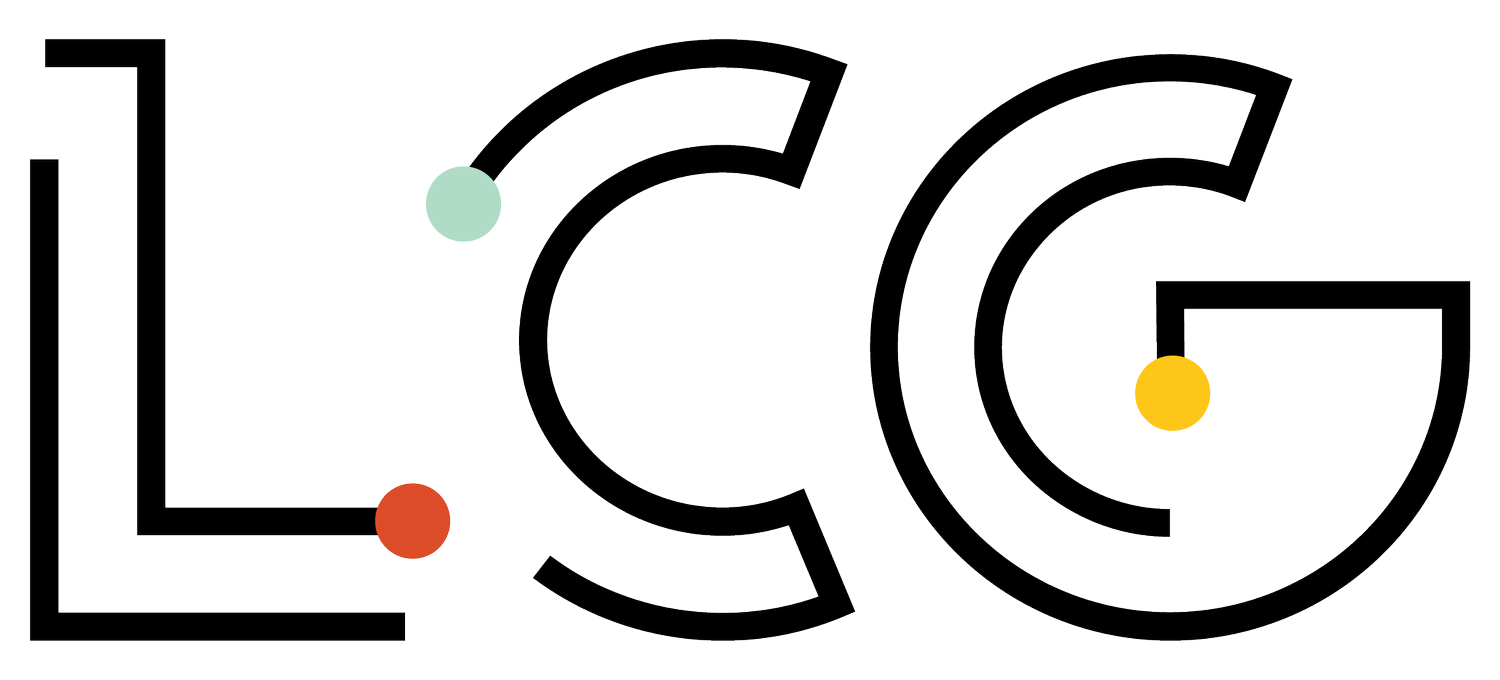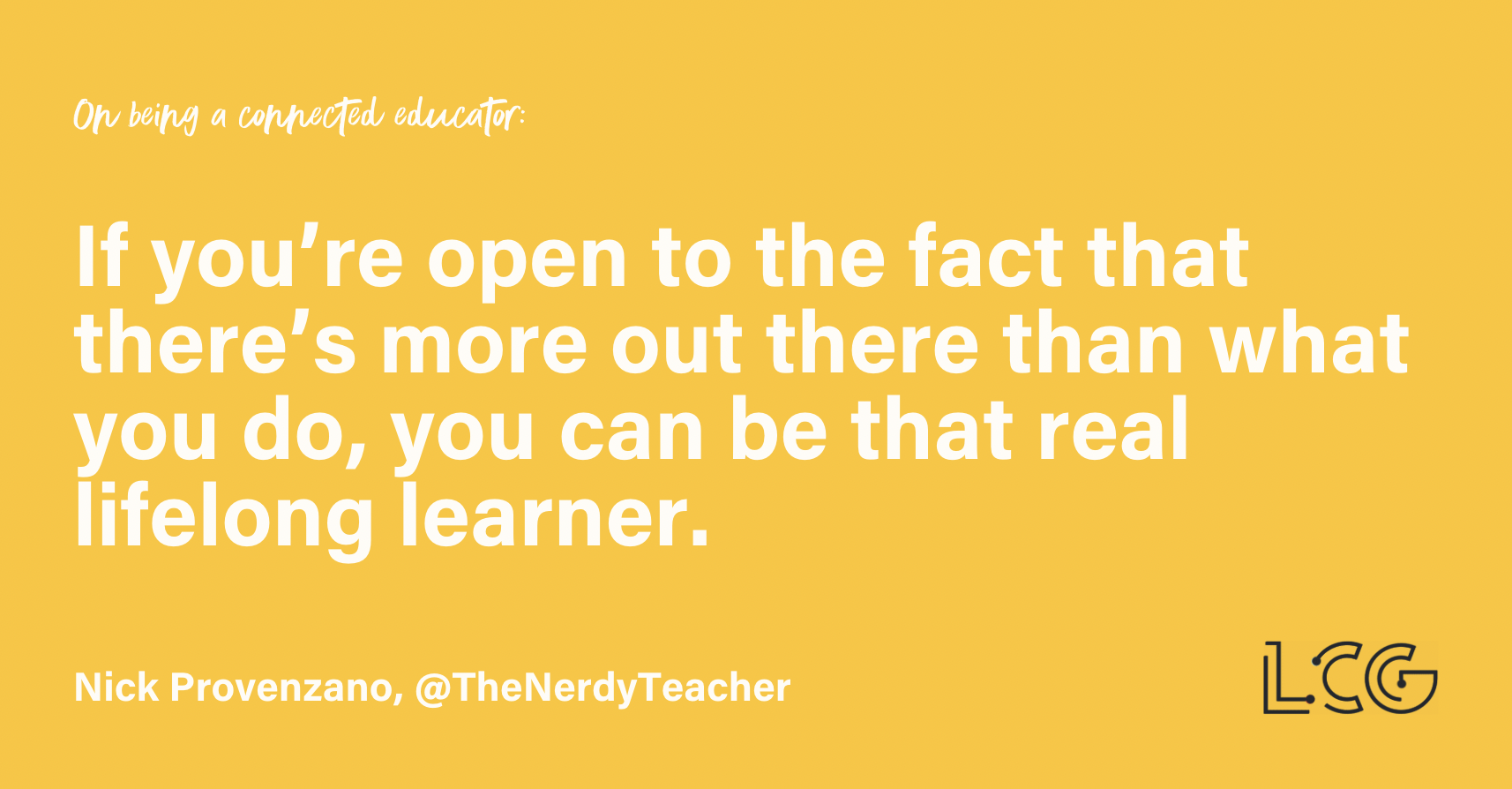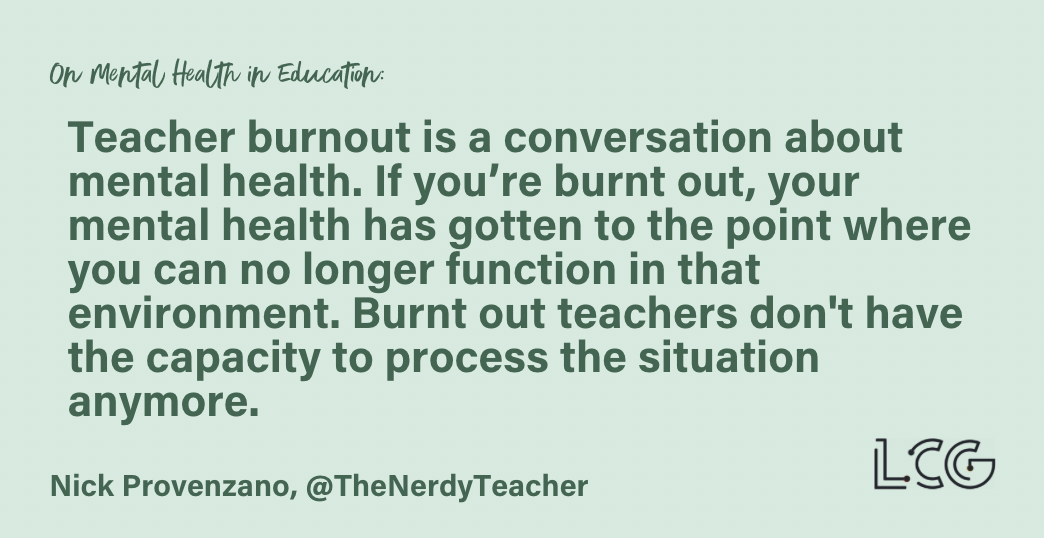This week, Elana sits down with Nick Provenzano, an educator of over 15 years, technology integrator, makerspace director, speaker, and author. During the chat, Nick emphasizes the value of connections between educators, opens up about the importance of normalizing conversations about depression and anxiety in education, and provides tips for educators on how to collaborate with EdTech brands.
The Value of Being a Connected Educator
All of Nick’s EdTech certifications, he says, helped turn him into the connected educator that he is today, providing him both opportunities and support when he needs it. Nick recalls, “luckily, now, because of the early days with Twitter and the connections I made with teachers all across the country and around the world, there are people now that I can jump on a chat with and say, ‘Hey, this is how I’m feeling about the situation. Am I crazy? Am I overreacting?’ So that’s nice.”
Nick says that the value of those connections has come in the form of both knowledge and opportunities. “If you’re open to the fact that there’s more out there than what you do, you can be that real lifelong learner. I have so much to learn, still, and so much to hopefully bring to students that you have to be OK with saying I don't know, yet, and I want to learn, and hopefully I’ll get there. Because as a teacher if you can’t be there, I don't know how you can expect the students to be there.”
The connections Nick has formed throughout his career have given him different perspectives on education around the world. “It’s actually culturally very interesting to talk to educators from vastly different cultures than the American Midwest. I get to connect with teachers from Alabama, San Francisco, or down in Florida, or Maine, or the UK. It’s all so different. And it’s funny because as teachers we all have the same goal no matter where we are. We’re trying to support these students.”
Another way that Nick says his connections have helped throughout his career was in the form of his mentor. He says, “Whether you’re in a pandemic or not, you’re going to have problems. You need someone that you can go to say, ‘I’ve screwed up. How do I make this better?’ Or ‘I don't know what I’m doing. Where do I go from here?’” Nick credits some of his education wisdom to having a mentor. “My mentor showed me how the sausage was made and how you’re going to have big feelings about certain things. And there are certain things worth having big feelings about and that there are certain things that are not,” Nick says. For all teachers, but especially new ones, Nick says, “my advice is to find your mentor. I’m close to 20 years in now, and I still need mentoring. I still need that person that I wish I could be like, “Hey, man, this is what’s going on in my class. What do you think?”
Now, as a veteran teacher, and as he continues to get support from his connections, Nick finds himself in the role of mentor to some newer teachers in his community. Nick says, “It’s weird because I don't have all the answers. I still feel weird calling the head of our school by his first name.”
Normalizing Conversations about Mental Health in Education
Like so many others across the country (around 40 million Americans), Nick struggles with his mental health, particularly depression and anxiety. Nick is very open about these challenges and speaks to normalizing these conversations within education and life in general.
“I say, ‘I have anxiety. I deal with depression.’ Or I’ll say, ‘Oh, yeah, I was talking to my therapist.’ It’s just normalizing it in terms of how you talk about it. The only way you normalize something is by normalizing it. I know that sounds stupid, but you just have to talk about it and you have to not be afraid and we have to accept that people don’t handle the thing.”
Having conversations about mental health, Nick says, helps normalize how we feel about our own mental health struggles, and feel less alone. “Depression lies. It’s trying to tell you how terrible you are and how much people don't really like you. All these teachers out there just like I am, waiting for the day they get the email from whoever that says, ‘Hey, we actually thought about it. You don't know anything. Sorry, it took us this long, but you don't know anything about anything. So, yeah, don’t bother contacting us.’ Like it’s a real thing.”
After posting a blog about his struggle with depression, Nick felt a wave of support from fellow teachers struggling with their mental health. And these comments resonated with him as “you’re not alone and all of this.” If mental health is something everyone struggles with, Nick says “I’m tired of hiding this. I shouldn’t be embarrassed by this. If you see me acting in these types of ways, understand this is where I’m at. If I’m talking to you but I’m avoiding eye contact and I’m just sort of like I seem distracted, it’s because I’m fighting this internal struggle in my brain.” And that is okay.
With the demanding and usually underrecognized work that they do, these conversations are especially important for educators. “People love to put teachers up on pedestals and then tear them down and then put them back up.” Nick explains a sensation of whiplash, between praise for the ability to teach kids and criticism for not doing a good enough job, or “indoctrinating” the kids in the class. “I’m like, ‘Do you know what those words mean? If I could indoctrinate your kids, I’d have them be able to write their name on their paper at the top like I’ve been telling them every single day.’”
If we don’t have conversations about mental health with educators, we run the risk of educators burning out of the field. “When you talk about teacher burnout, you’re talking about mental health. If you’re burnt out, that means you’re emotionally done, which means that your mental health has gotten to the point where you cannot function in that environment. It sounds like, ‘I’ve got nothing left to bring to the table.’ Burnt out teachers don't have the capacity to process any more of how to deal with the situation. And so I talk about mental health.”
How Educators can Collaborate with EdTech Brands
Teachers and EdTech brands are always collaborating, and it's unfortunately common for teachers to be undercompensated for their efforts. Nick says, “teachers are so easy to take advantage of because we’re not compensated in the traditional manner. Also, we are humble by nature. Because we’re so used to not having. We’re so used to, ‘Oh, you don't get this.’ Or ‘We don't have the budget for that.’ And saying back, ‘Oh, I understand. OK, I’ll make do.’ That’s just a normal system of things.” If you’re an EdTech brand, Nick asked the poignant question, “If they were non-teachers, would you be paying them in sweatshirts?” That’s sort of how I try to talk to companies and say, “I bring value to what you’re doing, just like an employee would. But you’re coming to me because an employee that you have can’t do what it is I can do.” But working with EdTech brands can also benefit teachers a lot.
Because of teachers’ unique vantage point, their voices are incredibly valuable, especially in EdTech. “Grand scheme,” Nick says, “you would definitely pay more to hire someone to create content that wouldn't be as authentic on top of all of those things.” Nick knows these aren’t easy conversations to have. “It'll be awkward at first, teachers. It’s awkward. It’s awkward when I finally have to say, ‘So we had a great conversation but we have to talk about compensation now,’” Nick says. “There have definitely been companies that are shocked by that.” Earlier in his career, Nick asked his dad about how much he should be asking for when working in these types of roles. “[my dad] goes, “oh, well, I just kept saying a higher number until people stopped calling. And then that’s what I was worth,’” Nick recalls. “Just keep going up until someone says no. And then you go, ‘OK, I’m right around here.’”
Note: This interview was originally recorded on September 10, 2021, as part of the All Things Education and Marketing podcast hosted by Elana Leoni.
Take a look at the full transcript of Nick’s podcast episode.
Resources Mentioned in this Episode:
My Story Isn’t Over… Yours Isn’t Either, #SemiColonEDU, @kmishmael (all about the semicolon movement in education)
#NotAlone - National Mental Health Awareness Month (Nick’s recent blog post about mental health)
A Post I can’t Seem To Title, So I’ll Tell You It’s About Depression (One of Nick’s first blog posts about depression)
Mistakes As Part Of The Process #PBL #MakerEd #PBL (Nick’s recent blog about mistakes along the way)
Nerdy Teacher Gift Guide (Edutopia)
Nick’s Books:
Ted Lasso (A TV show that inspires Nick)
Star Wars: Visions (Something fun Nick is watching)
Connect with Nicholas Provenzano: Twitter: @TheNerdyTeacher | Instagram: @TheNerdyTeacher | Website: TheNerdyTeacher.com
Episode Skeleton (use this to jump to the parts you want to listen to):
2:30: Nick’s journey in Education
5:32: Nick speaks to keeping it real as an educator, and not presenting his perfect self, and toxic positivity
12:12: The value of becoming a mentor
16:33 The weirdness of seeing yourself become a mentor
19:10: How do we begin normalizing conversations around mental health?
25:05: “The only way you normalize something is by normalizing it.”
25:51: Depression is chemicals in your brain; learning your body.
26:03: “People put teachers up on pedestals just to tear them back down.”
29:40: Take a few things off your plate.
32:38: “Teachers wanna have fun because things suck sometimes.” Its okay to be silly sometimes.
35:30: “What is it you’re asking these teachers to do, and if they weren’t teachers, would you be paying them in sweatshirts?”
38:15: Teacher time is valueable.
39:57: It is awkward to ask for your compensation.
43:29: I didn’t know that this is what my career would become. “Its strange, its weird, I don’t know.”
47:17: Know who you are and what that is worth.
47:38: “I just kept saying a higher number until people stopped calling. And then I knew what I was worth.”
51:04: The cultural knowledge of being a connected educator.
55:35: What inspires Nick? His wife, and his students.
56:13: And also Ted Lasso
Elana Leoni, Host
Elana Leoni has dedicated the majority of her career to improving K-12 education. Prior to founding LCG, she spent eight years leading the marketing and community strategy for the George Lucas Educational Foundation where she grew Edutopia’s social media presence exponentially to reach over 20 million education change-makers every month.
Nicholas Provenzano, Guest
Nicholas Provenzano is a Teacher and Makerspace Director at University Liggett School in Michigan. He is also an author, makerspace builder, international keynote speaker, and consultant. He writes on his website, TheNerdyTeacher.com, Edutopia, as well as many other prominent educational websites. He has been featured on CNN, Education Week, and other media outlets. He has been recognized as the Technology Teacher of the Year by MACUL and ISTE. Nicholas is a Google Certified Innovator, Sphero Hero, Microbit Champion, ASCD Emerging Leader, Microsoft Minecraft Mentor, Raspberry Pi Certified Educator, Adobe Education Leader, and a TEDEd Innovative Educator. His best-selling books, Your Starter Guide to Makerspaces, The Maker Mentality, and Beyond the Poster Board can be found on Amazon. Nicholas is sharing plenty of nerdy things on Twitter and Instagram at @TheNerdyTeacher.
About All Things Marketing and Education
What if marketing was judged solely by the level of value it brings to its audience? Welcome to All Things Marketing and Education, a podcast that lives at the intersection of marketing and you guessed it, education. Each week, Elana Leoni, CEO of Leoni Consulting Group, highlights innovative social media marketing, community-building, and content marketing strategies that can significantly increase brand awareness, engagement, and revenue.
Rate, Like, and Subscribe
Let us know what you thought about this episode by rating and reviewing our podcast. Click here, scroll to the bottom, tap to rate with five stars, and select “Write a Review.” Then be sure to let us know what you loved most about the episode! Also, if you haven’t done so already, subscribe to the podcast to be notified when we have more content to share with you.






